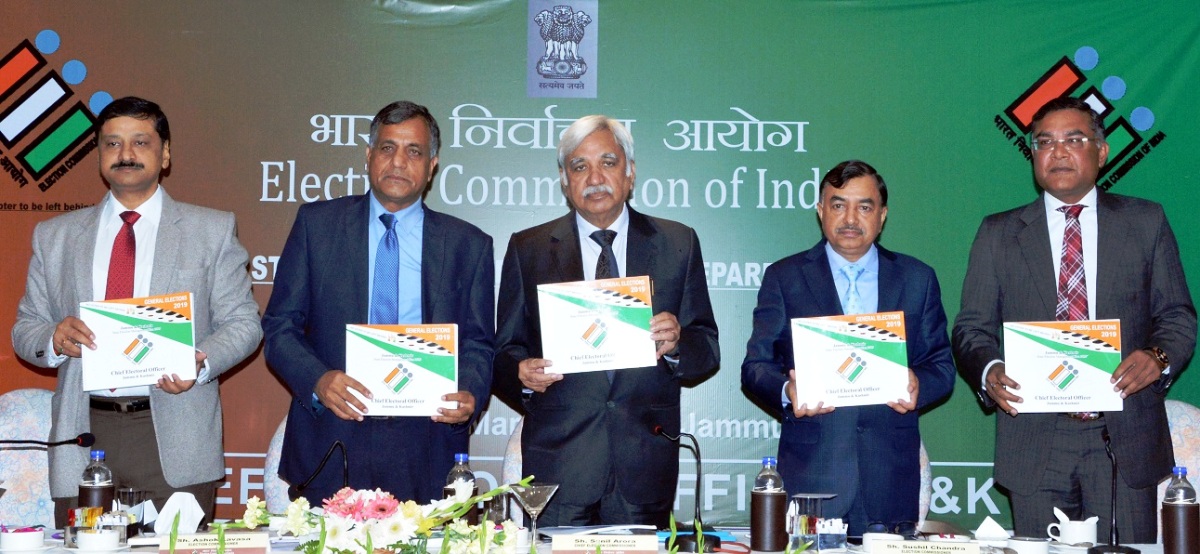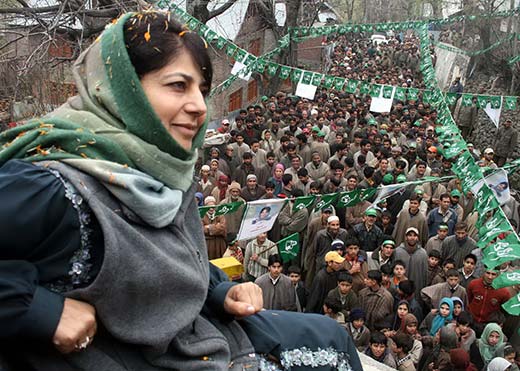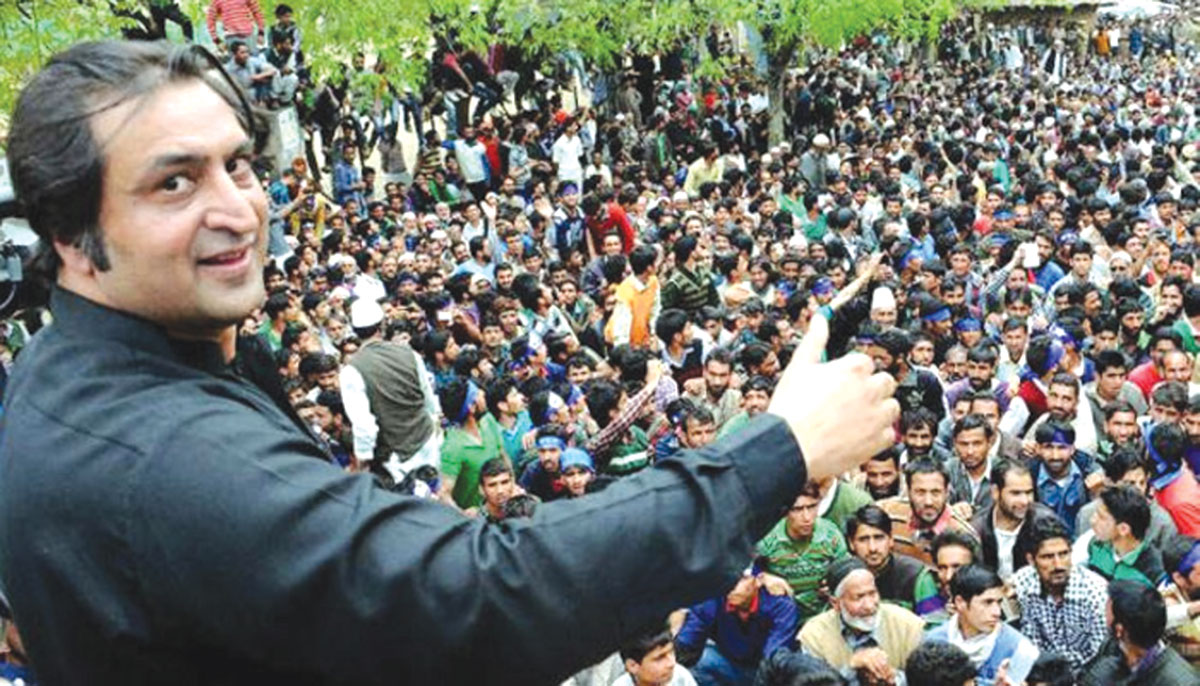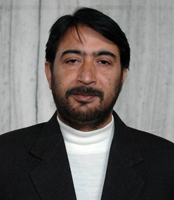Kashmir parties are upset with the Election Commission’s decision of delinking the assembly from the Lok Sabha elections in Jammu and Kashmir. Some even said it was Delhi’s surrender before the separatist forces and Pakistan. But Saima Bhat reports the contradictions and the crisis that was visible in Kashmir’s political class, after the announcement

Kashmir and elections share an intertwined history of uncertainty and unpredictability. The decades-old political instability never fades away but returns in diverse forms. The latest was on Sunday, March 10, when the Election Commission of India (ECI) delinked much-awaited Assembly elections from the Lok Sabha polls.
The common refrain was: ‘How is situation conducive for one election and not for another one.’ Almost all unionists reacted sharply with the same message: “India delayed democracy in Kashmir.”
The Discussions
In March first week, the ECI team visited the state to assess the feasibility of holding the two elections. Headed by Chief Election Commissioner (CEC), Sunil Arora, the team met political parties and the top officials of the security establishment and civil administration, in Srinagar and Jammu. Surprisingly, Sajjad Lone led Peoples Conference was not invited.
The team were told that both the exercises must take place simultaneously. Political parties insisted the “restoration of an elected government in the state was urgently needed as the Governor’s administration was taking decisions on matters with huge ramifications.”
The Announcement
On March 10, Arora announced the election schedule for 17th Lok Sabha, invoked the Model Code of Conduct (MCC) but delinked the two elections. Interestingly, Jammu & Kashmir, currently under Presidential rule and due for state elections, was singled out by the commission citing “security” as the reason.
Instead, the Commission constituted a committee comprising “eminent” members, two retired IAS officers and a retired IPS officer to assess the situation on the ground in J&K before it takes a decision about holding the assembly election. The penal of “special observers” comprises Noor Mohammad, Vinod Zutshi, and AS Gill.
These observers will be “regularly and on a real-time basis” monitoring the situation in the state and the decision of holding assembly elections “will be taken soon”.

The deferment, CEC said, was done on basis of the inputs from authorities regarding constraint of availability of central forces for enforcing security in the wake of recent violence. Even the parliamentary election for the south Kashmir seat is going to be held in three phases, thus creating new precedence in India’s electoral history.
The south Kashmir Anantnag constituency was already a record for being vacant since 2015 when Mehbooba Mufti resigned and took over as the Chief Minister. It barely was represented in the Lok Sabha for two years.
Mainstream Reacts
Barring BJP, everybody felt hurt?
National Conference, the grand old party in Kashmir politics slammed Narendra Modi government for keeping the state in continuous “uncertainty”. “All parties are in favour of holding simultaneous elections,” Dr Farooq Abdullah said. “Environment is conducive for Lok Sabha polls but not state polls in J&K? Local body polls were held peacefully, there are enough security forces present; then, why can’t state elections be held?”
Omar Abdullah, his Deputy, who was celebrating his 49th birthday and busy replying his well-wishers on Twitter, was surprised by the announcement. “With the number of international attention elections in J&K attract, I never thought PM Modi would be willing to confess his failure on a global stage but we all make mistakes & that was mine,” Omar tweeted. “Balakote & Uri are not symbols of PM Modi’s handling of national security, J&K is, and look at the mess he has made there. The abject surrender to anti-India forces is a crying shame.”
Security, Omar indicated, was not a problem of the ECI. It was him and his party members who have to go to the people and he feels no problem in doing that, he told a TV channel.
Peoples Democratic Party (PDP), the erstwhile BJP ally, said the decision is “antithetical to the very idea of democracy”. Party president, Mehbooba Mufti said the decision confirmed the “sinister designs of Government of India.”

“Not letting people elect a government is antithetical to the very idea of democracy,” PDP whose ill-fated alliance fell after BJP pulled the rug in 2018 summer. “It is also a tactic of buying time to dis-empower people by pushing an agenda that suits their ulterior motives.”
Mufti aide Naeem Akhtar termed it “inexplicable, irrational and undemocratic”. “The BJP wants to continue ruling the only Muslim majority state directly because it knows that it has now no chance of doing it through the elected mechanism.”
Akhter believes the BJP is actually aiming at ‘fiddling with the special status of the state’ and is perhaps trying to split the majority community further. “They are trying to help their fifth column which they are maintaining in Jammu and Kashmir, so that they can get their exclusive government and do away, perhaps, with the special status,” Akhter said. “It is very sinister design.”
Congress said Delhi’s tall claims with regard to the situation in the state stand exposed as it certified the situation is out of control. “It was the golden chance for the Centre to hold assembly election in order to give an elected government to the people as all the political parties were of the opinion that simultaneously elections should be held in the state,” state Congress president G A Mir said. “But it failed.”
A “disappointed” CPI (M) said logistics for the two polls remain the same. By conducting elections twice, Yousuf Tarigmai said it means “exposing the poll machinery twice, putting political class at risk twice. Otherwise, we can use the same polling booth for both elections, sanitisation of the area will be same, polling staff and security cover will be same.”
“If I am ready to go to the people and so are other political parties, what is the discomfort in South and North Block,” Tarigami asked, insisting it is a mystery. “When we don’t feel insecure then what is the problem in having election simultaneously.” He regrets CEC did not act on his own and instead relied on the assessment of different appendages of the government.
Kashmir’s vocal two-time lawmaker Engineer Rasheed said it is “a controlled democracy” where bureaucracy is powerful. There could be only two things: “Either the mainstream has lost credibility before Delhi or Delhi is feeling threatened by them.”
“Either Delhi has turned so arrogant or she is unable to understand the mood at state, national or at international levels. But what is a fact is that Delhi is pushing mainstream to the wall using their muscular policy,” Rasheed insisted.
Much before the assembly was dissolved, Rasheed had given up state accommodation and state policy security. “Isn’t it bizarre to give security reason for not conducting elections? I am two times MLA and I am not given any security but at the same time, I see people who have never won an election but have at least a cavalcade of seven state vehicles escorting when they visit their constituencies,” Rasheed lamented.

In 1996, when Rasheed was an engineer, Delhi “used to literally beg before the local parties and even street vendors to conduct elections”. The change, he said, is that now “these parties beg for elections”.
The 1996 Election
After the 1987 polls which the NC-Congress alliance rigged thus paving way for the militancy to erupt, the next exercise came in 1996. Though the security grid literally dragged the people to the polling stations – they did not tell them whom to vote, 1996 exercise is a turning point in restoring the civilian government after a long, brutal six years hiatus. After Dr Abdullah got history’s biggest mandate, he broke down while taking the oath of office.
“This is a watershed election in which we want to show the world the civil face of a civilised society,” the then CEC M S Gill said after the 1996 polls were over. Commented the former commander of the Srinagar based 15 Corps, Syed Ata Hasnain: “It was just seven years after the commencement of the turbulence in Kashmir. It was one of the boldest decisions to conduct those elections.”
The 2002 Shift
Unlike the 1996 elections, which was a huge military exercise, the 2002 elections were comparatively clean and fair. It helped Delhi get some of the best brownie points ever on Kashmir front. The exercise led to the formation of a coalition between Congress and the PDP.
2008 brought NC back with a Congress as an ally, and 2014 polls that were held after devastating floods, PDP chose to ally with BJP. The North Pole – South Pole alliance had inherent contradictions. Prime Minister Modi refused any counsel on Kashmir and publicly rebuked Mufti Sayeed in Srinagar. After his death, Mehbooba took over and failed to retain the cohesion of a government that was inherently weak within. BJP pulled out in 2017 summer and Kashmir landed in yet another crisis.
Now the situation is no different from the early 1990s.
The Challenge
The real big question is: how to hold polls peacefully and how to manage participation? Militant threats are manageable but electorate mood is not. Within days after the Lethpora bombing on a CRPF convoy, the government initiated a crackdown against Jamaat-e-Islami (JeI). In a quick follow-up, it banned the party. MHA said the ban was because it radicalises youth and has connections with militancy.
But a senior police officer, wishing anonymity, said there has been “no FIR with such charges nor a single intelligence diary entry” against any JeI member since 1998 when the party declared it was not in favour of armed insurgency.

“I see this ban will help Jamaat in a strong re-emergence. They will become more relevant and people have already started reading more about its origin and history in Kashmir,” says a political analyst. Whether or not the ban was the outcome of any report by the state police, the Kashmir politicians saw it as the use of muscular powers against Kashmir and it became a poll issue for every party.
The ban brought top unionist leaders on road. Engineer Rasheed sees even the protests against Jamaat ban as “sheer politics”. “It could be having a cake and eating it too,” he said in an obvious reference to Mehbooba who was on the road.
The BJP 2.0 actually reversed the BJP policymaking of the Vajpayee era. Then, the NDA had realised the need for political outreach. In 2004, the Hurriyat Conference, led by Mirwaiz Umar Farooq, entered into a dialogue and met both the Prime Minister and the Deputy Prime Minister.
Now the same Mirwaiz, stripped off his security, is living in the security of a bunch of young men. He has been summoned to Delhi by NIA and he is not ready to oblige them.
“Delhi is discrediting everyone, and by doing so, it seems is running short of options by pushing people to radicalisation and by choking space.” Rasheed believes.
“The choking of the public, political space and the political voices is not a good sign. I think we have to brace up for very hard times as our identity is at stake,” adds Akhtar.
Pakistan’s foreign minister Shah Mehmood Qureshi, in a TV interview, has thrown a new spanner. He suggested Delhi talk to Farooq Abdullah and Mehbooba Mufti “if they are not ready to talk to the separatist leadership”.
“When Pakistan can own even her enemies in Kashmir, Delhi needs to introspect why it is earning only enemies in Kashmir,” asks Rasheed.
But how is all this going to play in the forthcoming polls is too early to say.
Security Issues
“In 1996, we have tackled various militant groups operating in the valley that had the strength of around 3000, including the dreaded foreign mercenaries,” a senior police officer confided. “Today, we don’t have more than 300 militants who are mostly locals with little or no training,” he adds.

With the law and order situation on a downward spiral, the officer said managing the similar type of exercise multiple times is not a wise decision. “Holding two elections in a year is cumbersome,” the officer, deployed on the ground, said.
Sources in ECI revealed that the state Home Department had sought additional 1,000 paramilitary companies in case the two elections were to be held simultaneously. Home Ministry did offer 500.
By average, police sources said, they need 10 personnel for every candidate. “If assembly elections would also be held in 46 segments in Kashmir, there would be around 500 contestants and the requirement of paramilitary forces would be around 5,000 Police personnel,” the officer said.
A Compulsion
Holding Lok Sabha election is a national compulsion, observes journalist analyst Sheikh Qayoom. “Whatever the situation, the parliament has to be elected in time.”
For Lok Sabha election in Kashmir that has traditionally witnessed low participation, Qayoom says a maximum of nine or twelve individuals would contest for three seats and the maximum rallies will be 10 to 15. But if the assembly elections are announced that means 46 constituencies, which means 600 to 700 candidates. “That will need more security for holding these rallies and providing security this time won’t be technically possible when the elections are going across the country,” he added.

Qayoom sees the outcry for simultaneous polls flawed because assembly polls are a huge task. “In the last by-election, we saw eight civilian killings. No election in the world is worth a single life,” Qayoom insisted.
The other factor for the delay is political. “If it is NDA government in the centre, its people will definitely feel they can influence some more seats. The party in power obviously has an edge,” Qayoom said. But he insists that holding polls for a single seat in three phases is history.
“By delaying state assembly elections BJP has discredited entire political class in Kashmir who have already been at the margins,” said a senior journalist who wishes to stay anonymous. “How will they talk about democracy to Kashmiris when they are themselves pushed to the edge under BJP.”
For Whose Benefit?
It is obvious that delay is going to benefit the BJP in Jammu, or it believes so. But this is not hugely correct that the entire political class was supportive of simultaneous polls in the state. Political grapevine is “some other parties or those being formed” may be benefitted.
“By not holding both the elections simultaneously, it is the biggest loss to National Conference mostly but then you never know what happens in Kashmir as the situation is always unpredictable,” says a senior NC worker wishing not to be named.

“Every political party sharply reacted to convey their dismay over the deferment of elections but in their hearts, PDP was also not ready,” Qayoom said. “BJP was saying let us have elections but they too were thinking let us first get into power at the centre then they will have elections. I think mostly it is NC that feels betrayed.”
As on date, the politicians Kashmir Life talked to said participation will be modest. “We know how fair the elections have been in Kashmir as people with seven per cent claim to represent people,” Qayoom said. “The fact is that people getting seven per cent represent nobody.”
Minimum participation does support smart players on the ground.
The Impact
Two separate elections will add to the crisis Kashmir economy is in. Since 2014 floods, Kashmir markets are down. The tourism sector is literally on a ventilator. The year has already started on a bad note as the deadly Lethpora car bomb has already resulted in the cancellation of bookings.
“I had to refund the booking amount of around Rs 2 lakh as the group cancelled their proposed visit after the attack,” Suhail Wani, a tour and travel operator, said. “The dent to the New Year has been made.”
Bilal Mir, his fellow tour operator, is sceptical. “April, the month of opening the Tulip garden is the month of Lok Sabha elections, so it has gone. We have Yatra and maybe they will announce assembly polls. That will consume the entire season,” says Bilal.
The two elections mean two MCCs for two months each. That essentially means it will impact the public spending on development that normally takes care of at least a few sections of the society.
A ‘Surrender’?
Omar termed the ECI decision Delhi’s “surrender to Pakistan, to militants and to the Hurriyat”. Omar is not alone saying this. The discussion on the streets is the same.
“First time we have seen such a huge decision impacting the overall situation of the valley,” says Anis, a lawyer by profession. A senior officer in state administration says the delay would have its effect. “Elections help you to establish and legitimize the authority of the state while consolidating the gains of the electoral process.”

But there is a counter-narrative as well. As the election process started, the parties have taken their own route to the field. Omar is negotiating a pre-poll alliance with the Congress. There is a possibility that while NC will field candidates for three seats in Kashmir, Congress will fight in Jammu.
But still, it will not make a big difference. For the sake of participation, PDP will field candidates in Jammu too. This will divide the votes and could lead to BJP retaining the two Jammu berths. It has the potential of impacting even Kashmir because all the parties – NC, PDP, Congress and Peoples Conference – have their pockets of influence.
This was eloquently reflected by Rasheed. “NC is at liberty to approach for an alliance with the Congress but one has a right to ask NC leadership why it didn’t offer an alliance with PDP and other smaller parties,” Rasheed said. “Same is the case with PDP, whose leadership is busy in trying to regain its lost ground from the various suppressive measures being taken by its masters.” He sees the leadership of NC and PDP as “arrogant, egoistic and self-centred.”
NC, PDP, Congress and other parties had put up a major alliance in November 2018, to stake the claim for constituting the state government. As Sajad Lone also staked the claim with BJP support, governor Malik dissolved the assembly. Then, the pro-alliance parties had said they joined hands to prevent any tinkering with Article 35 (A). The situation remains the same.
“It is an idea that can be explored,” PDP leader Naeem Akhter said. “But the fact is that nobody called us for putting a joint effort. So everybody is working the way it goes.”
“If Omar says Prime Minister has surrendered before separatists,” quips a journalist. “By adding to the fracture of the majority vote, is it another surrender?”















